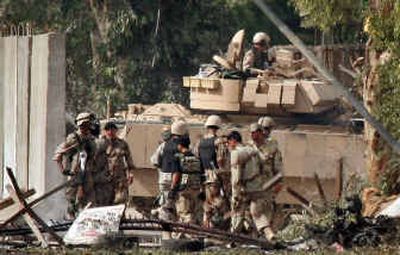Shiite-Kurdish coalition negotiations hit snag

BAGHDAD, Iraq – Talks aimed at forging a coalition government faltered Wednesday over Kurdish demands for more land and concerns that the dominant Shiite alliance seeks to establish an Islamic state, delaying the planned first meeting of Iraq’s new parliament.
The number of U.S. military deaths in the Iraq campaign rose to 1,500 today, an Associated Press count showed. A soldier assigned to the 1st Marine Expeditionary Force was killed Wednesday in Babil province in the so-called “Triangle of Death” south of Baghdad, the military said.
The snag in negotiations between Shiite and Kurdish leaders in northern Iraq came as clashes and two car bombings in Baghdad killed at least 14 Iraqi soldiers and police officers – the latest in a wave of violence since elections Jan. 30.
The group led by Iraq’s most wanted terrorist, Abu-Musab al-Zarqawi, purportedly claimed responsibility in an Internet posting for Wednesday’s clashes and at least one of the bombings – as it had for a suicide car bombing Monday that killed 125 people in Hillah, a town south of the capital.
“The bombings in Hillah and again in Baghdad this morning are not going to derail the political process that Iraq is embarked upon,” National Security Adviser Mouwafak al-Rubaie said Wednesday. “The Iraqi government will go after and hunt down each and every one of these terrorists whether in Iraq or elsewhere.”
But forming Iraq’s first democratically elected coalition government is turning out to be a laborious process.
Shiite and Kurdish leaders, Iraq’s new political powers, failed to reach agreement after two days of negotiations in the northern city of Irbil, with the clergy-backed candidate for prime minister, Ibrahim al-Jaafari, leaving with only half the deal he needed.
The Shiite-led United Iraqi Alliance, which has 140 seats in the 275-member National Assembly, hopes to win backing from the 75 seats held by Kurdish political parties so it can muster the required two-thirds majority to insure control of top posts in the new government.
Al-Jaafari indicated after the talks that the alliance was ready to accept a Kurdish demand that one of its leaders, Jalal Talabani, become president.
However, he would not commit to other demands, including the expansion of Kurdish autonomous areas south to the oil-rich city of Kirkuk.
Elsewhere, Saddam Hussein’s lead lawyer said this week’s murder of a judge appointed to a special tribunal to try the former Iraqi leader shows the country remains too dangerous for such trials.
“I can’t imagine how the court would begin,” Ziad al-Khasawneh told the Associated Press in Tokyo. “The streets are burning, the judges are killed. … The advocates and the judge, they need a quiet area to read, to study, to discuss. It is impossible to make these things this year, or after this year.”
Kurdish leaders have demanded constitutional guarantees for their northern regions, including self-rule and reversal of the “Arabization” of Kirkuk and other northern areas. Saddam Hussein relocated Iraqi Arabs to the region in a bid to secure the oil fields there.
Politicians had hoped to convene the new parliament by Sunday. But Ali Faisal, of the Shiite Political Council, said the date was “postponed” and that a new date had not been set.
The Kurds, he added, were “the basis of the problem” in the negotiations.
In another twist, alliance deputy and former Pentagon favorite Ahmad Chalabi was to meet today with interim Prime Minister Ayad Allawi, whose party won 40 seats in the assembly. It was unclear why the meeting between the two rivals was taking place.
Both Allawi and Chalabi are secular Shiites opposed to making Iraq an Islamic state. Concerns over a possible theocracy are especially pertinent because the main task of the new assembly will be to write a constitution.
Although Kurds make up only about 15 percent of Iraq’s population, they won 27 percent of the assembly seats — largely because most Sunni Arabs did not participate in the elections, either to honor a boycott call or because they feared attack by Sunni-led insurgents trying to disrupt the vote.
Wednesday’s attacks in Baghdad began when a car bomb struck an Iraqi army base, killing eight soldiers and wounding at least 25. A second car bomb an hour later at an army checkpoint killed four soldiers. Separate clashes killed two police officers, the Defense Ministry said.
Also Wednesday, an Internet statement in the name of the Ansar al-Sunnah Army claimed the killing of two Turkish drivers abducted Feb. 25 on the road to Kirkuk, and a Swede of Iraqi descent who was kidnapped last month pleaded for his life in a video left at an international news agency in Baghdad.
It was not possible to verify the authenticity of either the claim or the video.
The latest violence came a day after the killings in Baghdad of an Iraqi judge and his son, both of whom worked for the tribunal that will put Saddam and members of his regime on trial. Three gunmen in a speeding car raked the pair with gunfire as they were trying to get into a vehicle outside their home.
The shootings marked the first time any legal staff working for the Iraqi Special Tribunal have been killed.